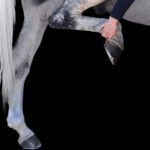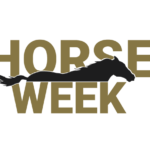
Wellington, Fla., Dec. 5, 2005–Mexico’s Jaime Guerra rolled out his own welcome mat two weeks after moving to Florida by winning three classes during his first visit to the National Horse Show–including yesterday’s finale, the $75,000 Budweiser American Grand Prix Association
Championship.
The veteran of two Olympics for his homeland may not have been a familiar face to the crowd that jammed the area around the Internationale Arena at the Palm Beach Polo Equestrian Club, but the other grand prix competitors know him.
“This isn’t any surprise to anybody that he popped up and won. He’s a genius,” said Ken Berkley, a New Jerseyan who settled for second on Carlos Boy behind the master rider aboard Santa Teresita Power Point, a nine-year-old Dutch stallion.

Jaime did just enough going “not crazy fast” to keep the rails in place and edge Ken by 0.36 seconds in the jump-off. Todd Minikus, normally a speedball with the dynamic Flier, wound up third, 1.49 seconds back of Ken, but he had an excuse for being uncharacteristically slow.
The championship’s made-for-TV format guarantees a jump-off, with the top eight from the first round qualifying for a second, shorter round over a different course, even if they have had a knockdown. Those who are clear in the first round can’t risk a rail, so they have to proceed
with caution. But since the faults are cumulative, it pays the 4-faulters to go like gangbusters in the second round.
“We had everything to lose; they had everything to win, because they already had one down. This event is complicated,” explained Jaime.
In this case, only Jaime, Ken and Todd got through the initial trip over the course without penalties, though Flier had to make an extra effort at an oxer that was the sixth of 13 obstacles. Todd, in turn, had to make an extra effort at 12C, going to the whip to get through the triple combination, with a long stride between the B and C elements, that caught half of the 26 starters. The irrepressible Todd is no fan of the championship’s format, and he blasted it, saying the concept “penalizes horses that jumped their ass off in the first round, as well as owners and riders.”If you go too fast (and have a knockdown in the second round), you’ve got to listen to the owner say, ‘You were going too fast and went from
first, second or third to eighth’.”
Todd’s thesis seemed to be proven by looking at the clock. Those with no faults from the first round completed the second round in times well over 50 seconds. The four-faulters (with the exception of eighth-placed Cara Raether, who is relatively new to the Grand Prix jumper game) all finished with times well under 50 seconds.
Todd also contended both the public and the press did not understand the scoring. He may be right. But if you really want confusing, consider the Saturday afternoon hunter classics. Except these two-rounders weren’t classics in the classic sense. They were part of the show’s Grand
Hunter Championship.
Wait. Didn’t we just have the Grand Hunter Championship on Friday, with Scott Stewart winning every division and taking the top prize on Chopard?
Yes, but this was ALSO called a Grand Championship in the program, with the scores from each divisional effort added into Saturday’s percentages. When I pointed that out to Gene Mische, the show’s president, he agreed a re-write may be in store for next year’s program. But forget the
printed page; this format was so baffling that even the winner of one section didn’t understand it.Holly Hays Orlando on Rio Renoir topped Scott aboard Fellini by a hair less than one point in the division for open hunters (read “professionals.”) She was thrilled, thinking she had won the Overdressed trophy that goes with the Saturday championship, because she had ridden Overdressed (now happily retired) to victory twice in the classic when the
National was held at Madison Square Garden.

But it turned out that the trophy was designated for the high-score horse from ALL divisions. In this case, that was Miracle, the mare aboard which Jack Hardin Towell Jr. had won the Grand Junior/Amateur Championship on Friday. Miracle’s score after the second Saturday classic
(limited to juniors and amateurs) was 2.51 percentage points better than Rio Renoir’s, so it will be Miracle’s name that is inscribed on Overdressed’s trophy. But that wasn’t sorted out in time for the prize-giving
ceremonies. As a result, it was decided to take separate presentation photos of both Holly and Hardin, and work out the details later about which was the real deal. That was a unique solution…
Aside from the exasperation cause by the scoring tangle, I wonder if too much was being asked of the horses at the end of the season. Chopard, who competed in the Regular Working Hunters with Scott, and in the Amateur-Owners with Krista Weisman, was pooped, like a number of the other
mounts who did two divisions. It was discouraging to see him drop a rail at the end of Saturday’s final round. Even though Miracle competed in just the junior division, she was tired too, Hardin said.
Aside from that, I think this was the most successful version of what some are calling the “new National” since the show moved down to Florida four years ago. Having the National come to Wellington really put horse sports on the map here with the public and the press, with a carryover
that has boosted the Winter Equestrian Festival too.
Saturday night was one of my favorite occasions of the year, the AGA awards dinner. It’s both low-key and elegant, held in the nicely appointed golf country club in that very desirable gated community, Palm Beach Polo, just a short canter from the showgrounds.
The evening offers a great chance to relax and spend a few minutes talking with friends you may have rushed by in the hullaballoo of the showgrounds. I chatted with Michael Matz, one of the greatest show-ring riders ever, who has gone on to training race horses. He hasn’t reached
the heights in his new profession that he did in his old one, but that may be right around the corner. Michael’s eyes shine when he talks about two promising 2-year-olds who could start in the classics next year. Wouldn’t it be great if Michael trained a Kentucky Derby winner? I think
it’s only a matter of time for this brilliant horseman.
At the dinner, Gene (“the founder of the feast,” as Charles Dickens would say) welcomed everyone to the “AGA MGE Annual Awards.”Of course,” he said, “we all know AGA stands for the American Grand Prix Association. The MGE stands for Margie Goldstein Engle.”
They really should name the dinner after her. This was the record ninth time she has won the Rider of the Year title.
Kent Farrington accepted the awards for Trainer of the Year and Horse of the Year for Madison, who he has brought along to great distinction. Ellen Whitaker of Britain’s famous riding family didn’t make it to receive the Rookie of the Year honors in person because of commitments at
home, but Margie wouldn’t have missed her dinner.

Sitting with Margie, her husband, Steve, and her chief horse owner, Mike Pulaski, were Margie’s parents, Mona and Irv Goldstein. They glowed with pride at their daughter’s achievements, but one gets the feeling that they are still a bit puzzled as to how such an equestrian emerged
from their non-horsey family. Mona (who recently wrote Margie’s biography, No Hurdle Too High,) can’t deny she’s nervous when her daughter jumps, and considering Margie’s lengthy list of injuries, that’s understandable. In fact, at the dinner, Margie bore a bruise on her left
cheek from a horse (no names given by this discreet lady) who had reared up and hit her in the face.
Well, a long season has finally ended. This is my last postcard for the year, so consider it my holiday greetings to all of you. I’ll be back in January to tell you about the goings-on at the U.S. Equestrian Federation annual meeting in Cincinnati.





